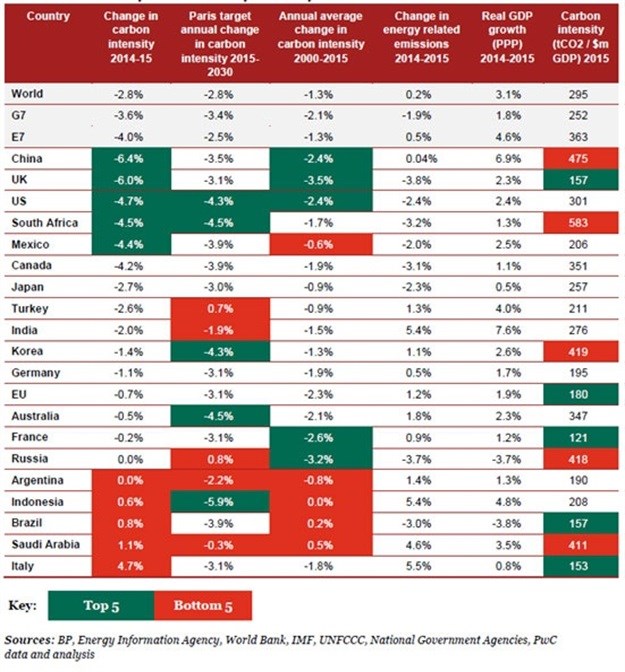The PwC Low Carbon Economy Index tracks the progress G20 countries have made to meet their carbon budgets and decarbonise their economies since 2000.
For the first time, China has topped an index measuring the carbon intensity of the major economies, as a result of falling coal use and a shifting economic base with rapid growth in less carbon intensive services.
The findings, from the eighth annual PwC Low Carbon Economy Index illustrate how recent progress to decarbonise is in line with national targets set by governments in the lead up to the Paris Summit. China consumes half the global coal output, so changes that affect consumption in that country have global significance for the coal market and emissions. It means that in 2015, the rate of decarbonisation globally more than doubled.
Emissions growth decoupling from economic growth
China, the UK, and the US led the way in the index, with others including some major emerging economies, showing sharp reductions in carbon intensity last year. South Africa, Mexico, Canada and India all exceeded their Paris targets, demonstrating for the second year running signs that emissions growth are decoupling from economic growth.
Argentina, Indonesia, Brazil, Saudi Arabia and Italy have more work to do as their carbon intensity reductions last year did not even meet the rate needed to meet their own Intended Nationally Determined Contributions (INDC) targets.
While this year marks a step change in the decarbonisation of the global economy, the report warns 2015’s high point is less than half of what is actually required to limit global warming to the levels committed to in the Paris Agreement.
For the last 15 years the global average decarbonisation rate has been only 1.3% a year, leading to predictions of the global carbon budget running out as early as 2036. However in the lead up to the Paris Agreement last year, carbon intensity fell by a record-breaking 2.8% (up from 2.7% in 2014). This is in line with the national targets set in the Paris Agreement. However, even at this faster decarbonisation rate, the global carbon budget will last only four years more to 2040.
Global challenge getting tougher
Jayne Mammatt, sustainability and climate change director at PwC, said: “In 2015 the world economy decarbonised at record levels but it still falls far short of the rapid reductions needed to achieve the two degrees goal. With each passing year, the global challenge gets tougher. To stay within the two degrees carbon budget, the annual reduction in carbon intensity now needs to reach 6.5%, up from 5.1% four years ago. If governments want to hit the global goal of ‘well below two degrees’ they will need to raise the ambition of their targets immediately and do much more to accelerate low carbon investment.”
For the private sector, the above highlights the need to think far beyond ‘business as usual’, rethinking risk and opportunity related to global developments and their related national commitments. As the latest Carbon Disclosure Project (CDP) results show, companies are already keenly aware of the regulatory and physical risks posed to them; and they rate these risks as highly likely and having high impact.
Mammatt added: “The issue for business is simply one of how to deal with risk. How do they react to a disrupted supply chain; changes to policy or regulation like carbon pricing; changing consumer preferences; financing long term infrastructure projects; or unpredictable extremes of weather?”
































